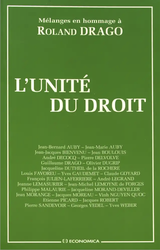
Updated: Sept. 8, 2018 (Initial publication: April 30, 2018)
Publications

► This working document was intended to serve as a support for a conference pronounced in French in the conference Droit et Ethique ( Law & Ethics) of May 31, 2018 in a symposium organized by the Court of Cassation and the Association Française de Philosophie du Droit. French Association of Philosophy of Law on the general theme Law & Ethics.
See a general presentation of this conference.
Rather, it has served as a support for the article to be published in the Archives de Philosophie du Droit (APD). This article is written in French.
► Summary: It is through the Law that the human being has acquired a unity in the West (I). What religion could have done, the Law also did by posing on each human being the indetachable notion of him of "person" (I.A). But this is what is challenged today, not the personality and the power that the human being has to express his freedom but the unity that implies in the disposition that we have of ourselves in repelling the desire that others have always had to dispose of us. Current law tends to "pulverize" human beings into data and transform into neutral legal services what was considered before as the devouring of others. The legal concept of "consent", ceasing to be proof of a free will but becoming an autonomous concept, would suffice (I.B.).
To prevent the reigning of the "law of desires", which merely reflects the adjustment of forces, we must demand here and now the ethical sovereignty of Law, because Law can not be just just be just the interests adjustment (II). We can form this request if we do not want to live in an a-moral universe (II.A), if we see that the unity of the person is the legal invention that protects the weak human being (II.B.). If we admit this imperative, then we must finally ask who in the legal system will express and impose it, especially the legislator or the judge, because we seem to have lost the ability to recall this principle of the Person on which the West was so centered. But the principles that are no longer said disappear. There would then remain only the case-by-case adjustment of interests between human beings in the world field of particular forces. At this yardstick, Law would be more than a technique of securisation of particular adjustments. Law would be reduced at that and would have lost its link with Ethics. (II.C).
April 1, 1996
Thesaurus : Doctrine

► Référence complète : L'unité du droit. Mélanges en hommage à Roland Drago, Economica, 1996, 503 p.
____
____
📗lire la table des matières de l'ouvrage
____
► Résumé de l'ouvrage (fait par l'éditeur) : "L'unité du droit peut se décliner sur plusieurs modes. Du point de vue général et théorique, l'accent peut être mis sur l'unité du système juridique, constat ou aspiration selon la définition que l'on entend donner au concept même de droit. Ce recueil d'études réunies en hommage au professeur Roland DRAGO illustre aussi cette dialectique constat-aspiration dans deux grands domaines chers au dédicataire, le droit économique et le règlement des litiges.
Au-delà des divisions académiques - doit privé, droit public ; droit interne, droit international - l'unité y apparaît alors plutôt sous le jour de la quête de l'harmonie du droit, dans l'interpénétration des concepts, des techniques et des contentieux, l'unification progressive des catégories juridiques, ou au moins la coordination des jurisprudences.
À travers ces illustrations, on perçoit combien les tâtonnements souvent maladroits des législateurs, des juges et de la doctrine ne découlent pas des hésitations intellectuelles d'une logique toute positiviste : qu'on le veuille ou non, le droit, c'est ce qui est droit, ce qui est juste. L'unité du droit, c'est d'abord cette aspiration, profondément humaine, à la rectitude et à la justice, qui anime le juriste et dont témoignent avec éclat la vie et l'oeuvre de Roland DRAGO.".
____
📝consulter une présentation de l'article du Doyen Vedel, "L'unité du droit. Aspects généraux et théoriques"
________
April 1, 1996
Thesaurus : Doctrine
► Référence complète : G. Vedel, "L'unité du droit. Aspects généraux et théoriques", in L'unité du droit. Mélanges en hommage à Roland Drago, Economica, 1996, pp. 1-8
____
► Résumé de l'article :
____
🦉Cet article est accessible en texte intégral pour les personnes inscrites aux enseignements de la Professeure Marie-Anne Frison-Roche
________